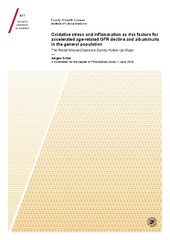Oxidative stress and inflammation as risk factors for accelerated age-related GFR decline and albuminuria in the general population
Permanent lenke
https://hdl.handle.net/10037/12838Åpne
Thesis (PDF)
Paper III: Schei, J., Fuskevåg, O.M., Stefansson, V.T.N., Solbu, M.D., Jenssen, T.G., Eriksen, B.O. & Melsom, T. (2017). Urinary Markers of Oxidative Stress Are Associated With Albuminuria but Not GFR decline. Also available in Kidney International Reports, 3(3), 573-582. (PDF)
Dato
2018-06-08Type
Doctoral thesisDoktorgradsavhandling
Forfatter
Schei, JørgenSammendrag
The prevalence of chronic kidney disease (CKD) increases rapidly with age, affecting more than one-third of people over 70 years old. The age-related glomerular filtration rate (GFR) decline is an important risk factor for CKD and kidney failure. Identifying novel risk factors for early kidney disease, manifested as accelerated GFR decline or low-grade albuminuria, may suggest underlying pathologic mechanisms for the development of CKD and prompt the opportunity for early-targeted treatment. Low-grade inflammation and oxidative stress are linked to aging and CKD. In particular, TNF receptors and urinary markers of oxidatively damaged nucleic acids have predicted GFR decline and albuminuria in people with diabetes. However, whether these biomarkers predict an accelerated GFR decline or albuminuria in the general population without CKD and diabetes remains unclear. The few previous studies from the general population are limited by the use of estimated GFR (eGFR), which is inaccurate and may be biased by non-GFR-related factors. In the Renal Iohexol Clearance Survey in Tromsø 6 (RENIS-T6), we measured the GFR (mGFR) in 1627 middle-aged people without cardiovascular disease, diabetes, or kidney disease. After a median follow-up of 5.6 years, 1324 participants underwent the same GFR measurements in the RENIS Follow-Up (RENIS-FU) study. In cross-sectional analyses from RENIS-T6, we found that the eGFR values based on creatinine and cystatin C were associated with inflammatory biomarkers independent of mGFR, indicating a non-GFR-related influence of inflammation on eGFR. In longitudinal analyses, we found that a higher baseline serum level of high-sensitivity C-reactive protein, but not of TNF receptor 2, was associated with an accelerated age-related mGFR decline and an increased risk of incident CKD. Markers of oxidative stress, measured as the urinary excretion of oxidatively damaged DNA and RNA (8-oxodG and 8-oxoGuo), were not significantly associated with the age-related mGFR decline, but higher urinary excretion of 8-oxoGuo predicted low-grade albuminuria at follow-up. Studies with an even longer observation period, multiple biomarkers, and repeated GFR measurements are needed to fully evaluate the effects of low-grade inflammation and oxidative stress on age-related GFR decline in the general population.
Beskrivelse
The papers I & II are not available in Munin.
Paper I: Schei, J., Stefansson, V.T.N., Mathisen, U.D., Eriksen, B.O., Solbu, M.D., Jenssen, T.G. & Melsom, T. (2016). Residual Associations of Inflammatory Markers with eGFR after Accounting for Measured GFR in a Community-Based Cohort without CKD. Available in Clinical journal of the American Society of Nephrology, 11(2), 280-286.
Paper II: Schei, J., Stefansson, V.T.N., Eriksen, B.O., Jenssen, T.G., Solbu, M.D., Wilsgaard, T. & Melsom, T. (2017). Association of TNF receptor 2 and CRP with GFR Decline in the General Nondiabetic Population. Available in Clinical journal of the American Society of Nephrology, 12(4), 624-634.
Forlag
UiT The Arctic University of NorwayUiT Norges arktiske universitet
Metadata
Vis full innførselSamlinger
Copyright 2018 The Author(s)
Følgende lisensfil er knyttet til denne innførselen:


 English
English norsk
norsk
